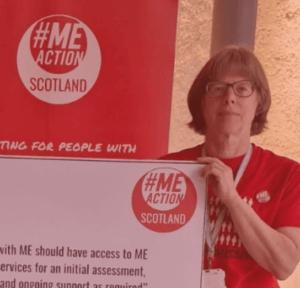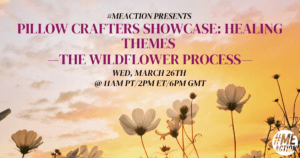The RECOVER-Treating Long COVID (RECOVER TLC) Kick-off Meeting was Sept 23-25 in person and over Zoom. I had the privilege of attending over Zoom and Jaime Seltzer, #MEAction’s Scientific Director, represented the needs of the ME community in person and as an invited member of a panel on clinical trial design. There were many speakers from the Long COVID and ME communities that gave tremendous input on where the future of this research should be headed, the need for inclusion, and accessibility. I would like to recognize this effort by those that spoke and how I know many people will be experiencing PEM because of the tremendous effort it takes not only to prepare and deliver comments but, in some cases, making the challenging and time-consuming trek across the NIH campus.
Below is a short analysis of the RECOVER initiative’s next steps.
In summary, The National Institutes of Health (NIH) created the RECOVER Initiative to study Long COVID and find ways to treat and prevent it. There were some major missteps in RECOVER outlined in the press, but now there is an emphasis on Patient and community involvement and a focus on treatments. #MEAction is hopeful for the future of RECOVER and we will need to hold the NIH to their commitments and promises.
Read the full analysis below:
The National Institutes of Health (NIH) created the RECOVER Initiative to study Long COVID and find ways to treat and prevent it. The initiative’s goal was to involve patients, caregivers, clinicians, scientists, and community members from many different backgrounds in the design and execution of RECOVER. RECOVER studies now include tens of thousands of people, hundreds of researchers, and millions of electronic health records.
However, RECOVER had a number of missteps, outlined in the popular press, in Nature, and covered in MEAction’s press release on the status of RECOVER last year. Stakeholders were troubled by the focus on observational data: collecting information without attempting to intervene. And there was only a small number of treatment studies– one of which was a cognitive retraining intervention, one of which was an exercise trial.
In addition, there was the concerning nature of who counted as a stakeholder and which stakeholders’ opinions influenced decision-making. People with ME/CFS were explicitly told they could not hold committee positions at first, and researchers and clinicians with background on infection-associated chronic illness had to fight to participate. And people with lived experience on committees reported that their participation was token at best; their input was downplayed or ignored.
Part of the reason for these missteps may have been logistical: RECOVER was initially helmed by cardiopulmonary folks within NIH, likely in part because it would have been beyond NIAID (National Institute of Allergy & Infectious Disease) to handle both a pandemic during a state of emergency and its sequelae simultaneously. Unfortunately, those helming RECOVER did not have much experience with inclusion of those with lived experience in general, or infection-associated chronic illness in particular.
But now, with RECOVER TLC, Long COVID is where it likely belongs– at NIAID– and the RECOVER TLC meeting was characterized by a sense of relief. Dr. Jeanne Mazzarro, who was selected to be the Director of NIAID just last year, has a Master’s in Public Health, and it showed: in who she chose to invite/include and in her summary speech at its conclusion. Her closing remarks were derived wholly from the meeting and had not been composed beforehand. Some of her major points are outlined below:
- Patient and community involvement is critical in all aspects of planning clinical trials from intervention selection, trial design, conduct, interpretation, dissemination, & implementation of findings; involvement should be “meaningful & real”
- Leadership should be accountable & transparent about the process, providing forums for regular opportunities to continue this dialogue
- Plan a larger (and more accessible) meeting once a year
- Blend the IACC experts and NIAID folks and those who have done the best work with RECOVER
- Shorter cycles for study – we can be rigorous while still recognizing urgency
- Work with FDA to determine endpoints for Long COVID
- Small, mechanistic trials w/interventions to understand best what to pursue
- Be sure to include peds/adolescent population, most severe, and work to include more racial & ethnic diversity in trials
Lingering concerns include the degree to which infection-associated chronic conditions will be included in ongoing research. During my panel, I emphasized the importance of trials that include subjects with ME/CFS prior to COVID. “It’s important for patients who contracted ME/CFS in the past, but also for those who will in the future. SARS-CoV-2 is not the first or the last pathogen that will be associated with onset of ME/CFS. If we do not include pre-COVID ME/CFS cohorts now, it will be easy to argue that interventions are only useful after COVID. And when the next pandemic comes, we will be starting from scratch.”
As we know too well, good conversations are just that. I am hopeful that RECOVER will shift based on the past two days of workshop but we will have to continue to demand action and accountability.
Additionally, the organizers of RECOVER-TLC have said they are dedicated to incorporating patient and advocate voices throughout every step of the new initiative and are inviting anyone to submit a written statement via the form linked here.
You can find our Scientific Director’s informal threads on RECOVER TLC starting here: It’s ME(Jaime): “At RECOVER TLC, a meeting hosted at NIH to discuss treatment trials for Long COVID. I’ll be on a panel later to discuss how what we know about other infection- associated chronic illnesses in trials for Long COVID.” — Bluesky (bsky.app).
#MEAction is focused on making sure the NIH, not only within RECOVER, holds true to their promises to the ME community.








